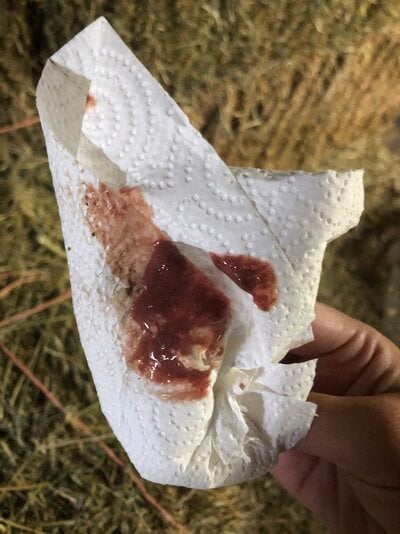HatchingFun22
Chirping
- May 16, 2022
- 37
- 63
- 81
This just happened as I was feeding and watering my chicks. They are 8 weeks old and are in the middle of the transition to become part of the flock. At least one of the chicks pooped blood as I was filling the water container.
Ive been letting them roam freely around the coop while the grown chickens are free-range during the day. They’re on a crumble mix but sometimes they get to the egg-layer pellets. None are acting listless, and all are fluttering around, pecking and scratching normally. The adults have normal poop from what i can see.
What should I do?
Ive been letting them roam freely around the coop while the grown chickens are free-range during the day. They’re on a crumble mix but sometimes they get to the egg-layer pellets. None are acting listless, and all are fluttering around, pecking and scratching normally. The adults have normal poop from what i can see.
What should I do?
Attachments
-
 95FE88C8-D0D6-4013-89C9-E2841ADB365D.jpeg626.3 KB · Views: 50
95FE88C8-D0D6-4013-89C9-E2841ADB365D.jpeg626.3 KB · Views: 50 -
 image.jpg820.1 KB · Views: 8
image.jpg820.1 KB · Views: 8 -
 893C959B-C9B1-45D2-B3B4-82E894F7E195.jpeg626.3 KB · Views: 6
893C959B-C9B1-45D2-B3B4-82E894F7E195.jpeg626.3 KB · Views: 6 -
 498F4C81-2600-4598-AF3C-79901B827A1D.jpeg490.8 KB · Views: 6
498F4C81-2600-4598-AF3C-79901B827A1D.jpeg490.8 KB · Views: 6 -
 40823B05-4C45-4032-AF79-8DA0966B9CA7.jpeg453.3 KB · Views: 7
40823B05-4C45-4032-AF79-8DA0966B9CA7.jpeg453.3 KB · Views: 7 -
 BB3055E5-1369-4FB2-BC97-36B55C4C2E72.jpeg543.5 KB · Views: 8
BB3055E5-1369-4FB2-BC97-36B55C4C2E72.jpeg543.5 KB · Views: 8




 I still think the bloody poop was caused by coccidiosis, however when there’s that much blood the case could have sadly escalated too much already. I would still continue with the medication, and hopefully your other chicks make a full recovery. Have you noticed any more bloody poop since administering the corid?
I still think the bloody poop was caused by coccidiosis, however when there’s that much blood the case could have sadly escalated too much already. I would still continue with the medication, and hopefully your other chicks make a full recovery. Have you noticed any more bloody poop since administering the corid?